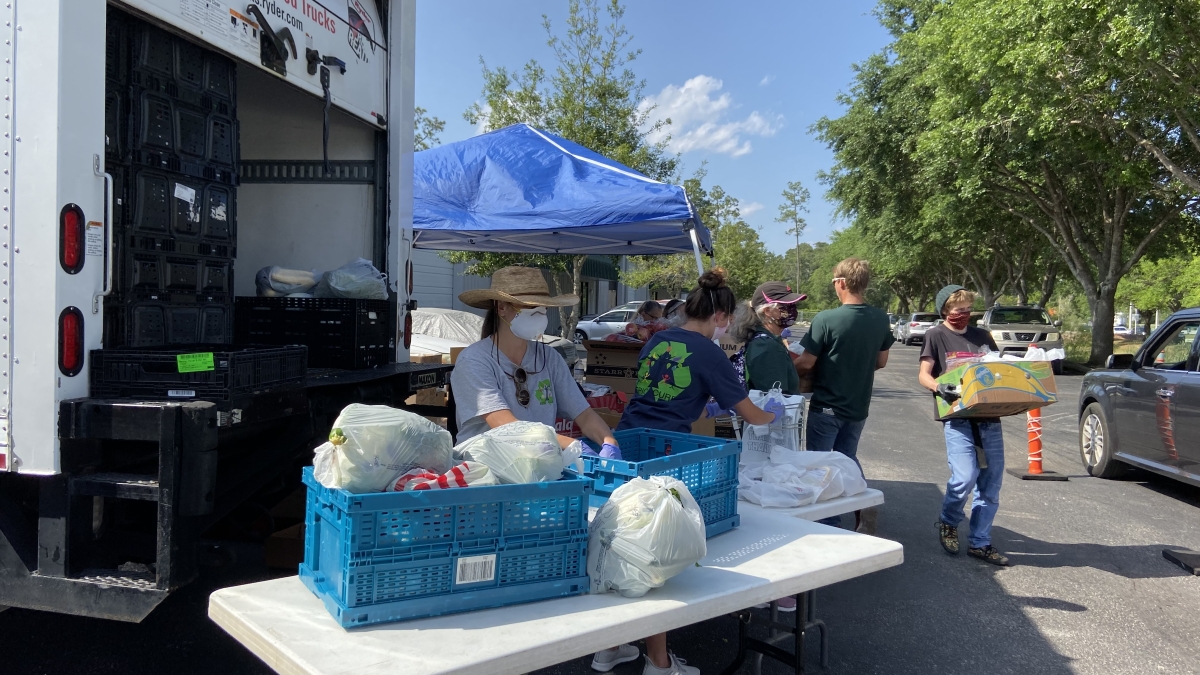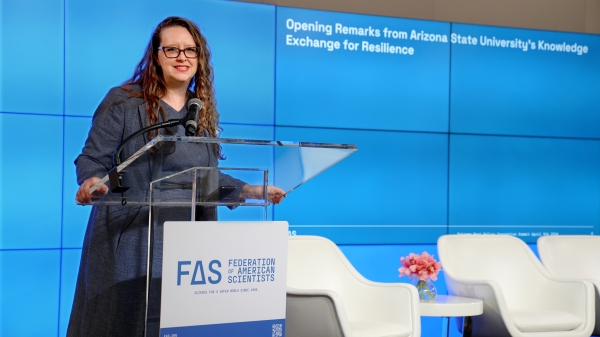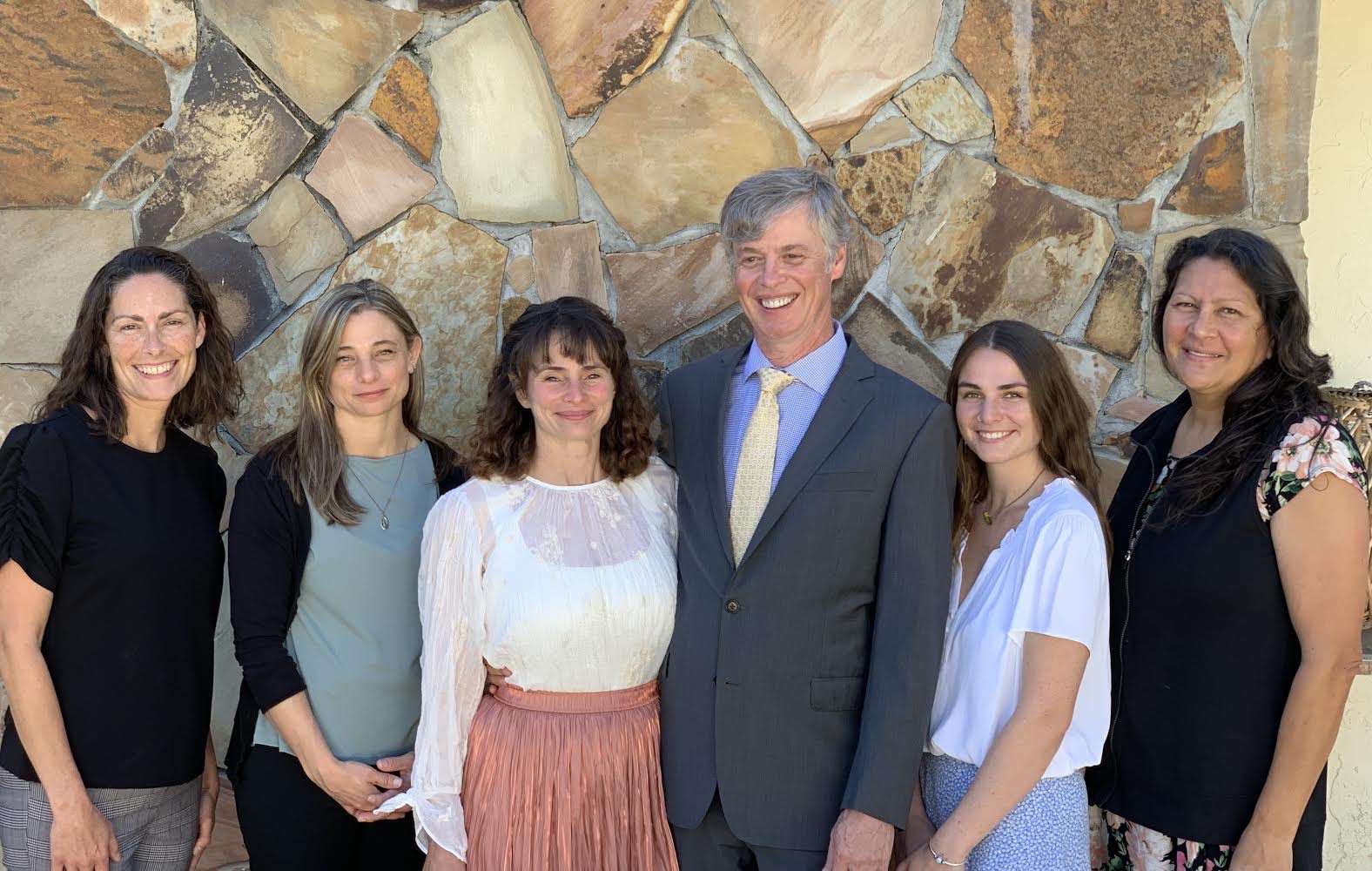ASU graduate student feeds community members affected by COVID-19

Volunteers work in the Epic-Cure food distribution line. Photo by Hanna Layton.
“The best laid plans of mice and men often go awry.”
— Robert Burns, paraphrased from the original text.
Arizona State University graduate student Hanna Layton’s plan for her master's degree in sustainability solutions culminating experience was to reduce food waste and food insecurity by providing a sustainability-based template for startup nonprofits intent on feeding hungry people. But her best laid plans were upended by the COVID-19 crisis.
In February, Layton was creating a comprehensive guide for sustainability-minded food distribution startups. The guide is based on her personal experience with Epic-Cure, a family-run nonprofit food collection and redistribution organization. Layton and her family started Epic-Cure in 2019 and moved quickly to feed other families in St. Johns County, Florida.
Epic-Cure’s dual goals are to feed hungry disadvantaged people and divert food waste from landfills, thus lowering the number of food insecure families and greenhouse gas emissions from landfills. In the United States, 40% of all food goes to waste, and 1 in 8 people are food insecure — including 1 in 5 children. Food waste produces 25% of the U.S. methane emissions, a greenhouse gas that is 25 times more potent than carbon dioxide and makes significant contributions to climate change.
In its first year, Epic-Cure distributed 550,000 pounds of rescued food to 25,000 individuals, and 5,000 pounds of inedible food to compost facilities and animal farmers. Most of the food was sourced from local grocery stores or markets and distributed locally. In the landfill, that amount of food has the potential to release over 522 tons of carbon dioxide equivalent greenhouse gas into the atmosphere.
By the first of March, Layton had made significant progress on the guide, outlining and dividing it into five sections. She was also organizing “how-to” video productions to supplement the guide and providing additional accessible information for food distribution startups. She also connected with people interested in testing her guide as they started new food distribution charities.
For spring break, Layton went home to discuss the project's progress with Epic-Cure’s board of directors. With their support she was set to move forward on her return to the Tempe campus, until ASU President Michael Crow directed all students to attend classes online. Knowing she could accomplish more on her project at home and close to Epic-Cure, Layton stayed in Florida.
Epic-Cure board of directors, from left to right: Charity Roberts, Wendy Lantz, Sunny Mulford, Ken Mulford, Hanna Layton and Michelle Anderson. Photo courtesy of Hanna Layton.
In the second week of March, companies began laying off and furloughing employees. Also, due to fears of shortages, food and other essential supplies disappeared from store shelves faster than they could be restocked. The most vulnerable, especially those living paycheck-to-paycheck, were hit the quickest and hardest.
In the face of the escalating crisis and diminishing food sources, Layton and Epic-Cure put the guide on hold. Instead, Layton focused on the problem at hand: Food was so scarce there was none to “rescue” from transport to the landfill. Epic-Cure had to find other sources of funds and food to feed the spiking numbers of food insecure people.
Layton and Epic-Cure’s board chose to see the potential catastrophe as a learning and growth opportunity. Epic-Cure made the shift from food rescue to disaster relief and Layton started to provide guidance to Epic-Cure and similar startups on building resilience capacity into their organizations.
A typical box of produce for a family. Photo by Hanna Layton.
"My project approach has become an active, on the ground approach. I have been working onsite at my organization's facility to work out the unfolding barriers to our service, to ensure that we can continue to aid the community through this tumultuous time," Layton said. "I developed an interdisciplinary team consisting of health care professionals, law enforcement, economists and leaders from national food aid organizations. With the multiple perspectives and via building out partnerships with other food aid services, food manufacturers and retailers, and federal agencies such as USDA, we have been able to satisfy the growing demand while taking all known precautions we can to ensure the health and well-being of our team and the people we serve.”
Some of the lessons she has learned from the COVID-19 crisis are transferable to other organizations and crises.
She says government agencies need to reduce mixed signals on priorities and coordinate information during times of crisis; food suppliers and distributors response systems and supply chains need to be more robust and flexible; and, nonprofit food distributors need to learn from the experience, establish reliable pathways to quickly increase distribution capacity in crisis situations and not return to a “business-as-usual” model.
Written by Paul Prosser, senior sustainability scientist, instructor and project partner liaison at ASU’s School of Sustainability.
More Environment and sustainability

Arizona adapting to heat crisis with initiatives featured in ASU report
Arizona State University's Knowledge Exchange for Resilience, also known as KER, released its Recommendations Report on Extreme…

Celebrating Earth Day around the world
Originating in the United States in 1970, Earth Day is now celebrated worldwide. But even before it became an official day, many…

A run on fossil fuels: ASU professor says climate legislation could have unintended consequences
As concerns about climate change grow, policymakers are increasingly voicing support for stricter fossil fuel legislation. Their…

